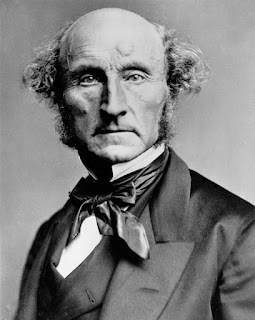John Stuart Mill (1806-1873) is a major character in the history of economics. Mill's greatest contribution to economics was his 1848 textbook Principles of Political Economy. This textbook was mentioned by David Warsh as one of the five most influential econ textbooks of all time. Warsh said,
"It is commonplace among students of the history of economics that each epoch must have its own text. In the two centuries since the very beginning of the field, only five textbooks have become dominating standards, the hold of each lasting for forty years or more: those of Adam Smith, David Ricardo, John Stuart Mill, Alfred Marshall and, since 1948, Paul Samuelson." (The Knowledge and Wealth of Nations)Mill discusses economic concepts such as: increasing returns, productiveness, stationary state, societal adulthood, the population problem and value. Warsh said
"Mill undertook to restate the vision that had been so persuasive in The Wealth of Nations subject, of course to the various scientific improvements that Ricardo had made... Like Smith and Marx, Mill took growth as his starting point in Principles of Political Economy. Nevertheless, Ricardo had been Britain's 'greatest political economist' Mill asserted and his 'pure theory' was basically Ricardian." (Knowledge and the Wealth of Nations, 2006)Upon finishing the book, Mill believed he had drawn a circle around the topic of economics and decided to essentially retire. Referring to his book Mill said,
"Happily, there is nothing in the laws of value for the present writer or any future to clear up; the theory of the subject is complete." (Quoted in Knowledge and the Wealth of Nations by David Warsh)Contrary to Mill's advice, economists rightfully continued the economics research project and Mill's textbook was eventually surpassed by the ideas of marginal revolution. Economist Friedrich Hayek says,
"It was only the 'marginal revolution' of the 1870s that produced a satisfactory explanation of the market processes that Adam Smith had long before described with his metaphor of the 'invisible hand', an account which, despite its still metaphorical and incomplete character, was the first scientific description of such self-ordering processes. James and John Stuart Mill, by contrast, were unable to conceive of the determination of market values in any manner other than causal determination by a few preceding events." (The Fatal Conceit, 1988)Economist John Kenneth Galbraith also gives a description of how Mill fits into the history of economic thought,
"There were also eloquent exponents of the established tradition - John Stuart Mill, for example - who were the great teachers of the day but who did not substantially alter the broad current of economic thought." (A History of Economics, 1987)Aside from economics, Mill made contributions many other topics such as liberalism, women's suffrage and social theory. Regarding Mill's temperament G. K. Cheston said,
"Mill was himself fresh and delicate and pure; but that is the business of a flower. Though he had to preach a hard rationalism in religion, a hard competition in economics, a hard egoism in ethics, his own soul had all that silvery sensitiveness that can be seen in his fine portrait by Watts... There shone in him a beautiful reverence for women, which is all the more touching because, in his department, as it were, he could only offer them so dry a gift as the Victorian Parliamentary Franchise." (The Victorian Age in Literature)
